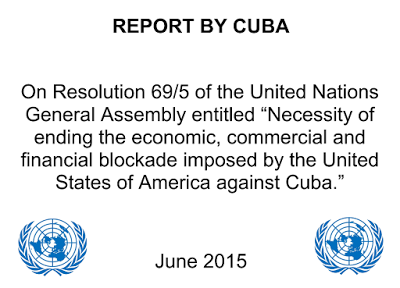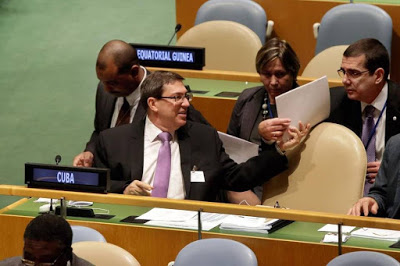Cuba USA
The embargo is one obstacle faced by the Cuban Internet -- the claim overlooks the impact of the Cuban economy and the government's fear of information freedom

On October 23th, the United Nations General Assembly is expected to vote on a resolution urging the United States to end its economic embargo on Cuba.
Last June, Cuba issued a report arguing against the embargo and claiming that it has cost the Cuban people $833.7 billion -- $57,122,900 of that in the sector of "communications and informatics, including telecommunications."
I looked at the telecommunication claims. The first dealt with infrastructure:
The second claim is that the embargo has violated Cuba's right to development:
This will be the 24th annual vote on resolutions calling for the end of the embargo. Last year, only the US and Israel voted no. There has been speculation that the US might abstain this year, since President Obama favors ending the embargo. I wonder how Israel will vote :-).
-----
Update 10/23/2015
The Guardian reports that the US has decided not to abstain from a vote on the resolution because it does not fully reflect the new spirit of engagement between the US and Cuba. Evidently the US asked for revisions that would let them abstain, but the revisions that were offered were insufficient.
I've only looked at the section on telecommunication, but if the rest of the resolution is as far off base as that section, I understand the administrations decision.
The vote is now set for October 27th.
-----
Update 10/27/2015
The vote is in and the resultion condemning the embargo passed by a vote of 192-2. Last year it was 182-2, but this year no nations abstained.
In his remarks, Cuban Foreign Minister Bruno Rodríguez acknowledged the new relationship with the United States, but said “the facts show crystal clear” that embargo is still being “fully and completely implemented.”
It is not fair for Rodriguez to claim that the embargo is “fully and completely implemented” since the Obama adminstration has removed meaningful restrictions. Sadly, that sort of one-sided rhetoric -- and the overstated telecommunications claims in the resolution -- is endemic in politics. that's what keeps Factcheck.org in business.
- Cuban Government Describes Devastating Effects Of U. S. Economic Blockade
by W.T.Whitneysource Counterpunch Meeting with reporters on September 17, Cuban Foreign Minister Bruno Rodriguez discussed his ministry’s recent report on the U. S. economic blockade against Cuba. The 36 – page document presents Cuba’s case in advance...
- The Plans Of Google And Internet Access In Cuba
By: Omar Pérez Salomón Source: La Pupila Insomne Google-Cuba: The company that owns the Google label whose main product is the search motor with the same name plans to invest 1 billion dollars reported the Wall Street Journal last June 2. This investment...
- What Is The Effect U.s. Trade Restrictions On It Exports To Cuba?
The Senate Finance Committee is researching the economic impact of U.S. embargo on trade with Cuba and I was asked to testify before the US International Trade Commission on the effects of the U.S. restrictions on our exports of telecommunication equipment...
- A High-level Us Delegation Is In Havana To Discuss Telecommunication And The Internet
I hope Cuba's policy is not shaped by political fear or the desire to protect government/ETECSA revenue and that the US delegation is not trying to influence Cuban politics or maximize the profit of US telecommunication companies. Conrad Tribble,...
- Cuban Apps In Google's (or Anyone Else's) Online Store?
A Google delegation, led by Scott Carpenter, Deputy Director of Google Ideas, and Brett Perlmutter, who had accompanied Eric Schmidt on his Cuban visit earlier this year, is in Cuba. They have visited two important technical universities and some of the...
Cuba USA
Cuban UN report condemns the embargo -- their telecommunication claims are overstated..
The embargo is one obstacle faced by the Cuban Internet -- the claim overlooks the impact of the Cuban economy and the government's fear of information freedom

On October 23th, the United Nations General Assembly is expected to vote on a resolution urging the United States to end its economic embargo on Cuba.
Last June, Cuba issued a report arguing against the embargo and claiming that it has cost the Cuban people $833.7 billion -- $57,122,900 of that in the sector of "communications and informatics, including telecommunications."
I looked at the telecommunication claims. The first dealt with infrastructure:
In the area of telecommunications, the export of products and services to Cuba has been authorized as well as funding for the creation of infrastructure facilities. Its principal limitation is the requirement of paying in cash and in advance, even when foreign or US banks based outside of the United States are now able to provide financing for these purchases. This is incongruous with international trade practices where this type of payment is not used and companies provide loans to the buyer in order to ensure the sale of their products and services. The possibility of carrying out these operations becomes more complicated because of the banks being worried about making transactions related to Cuba due to the policy of financial harassment applied under the government of President Obama.I'll abstain from commenting on the financial regulations and customs, because I don't know about them, but I will point out that the US is not the only telecommunication infrastructure supplier in the world. Most notably, China has provided a lot of Cuban telecommunication infrastructure.
The second claim is that the embargo has violated Cuba's right to development:
In the sector of communications and informatics, including telecommunications, there were adverse effects recorded in the period that totaled 57,122,900 dollars. Losses associated with revenues not earned and for the geographical relocation of business of the Empresa de Telecomunicaciones de Cuba (ETECSA S.A. for its acronym in Spanish) add up to over 38 million dollars due to the impossibility of accessing leading, high quality brands and/or equipment on the telecommunications market distributed by US entities. For similar reasons, the Cuban firm Copextel, dedicated to supplying and repairing telecommunications equipment, suffered losses of 2.5 million dollars.I have several problems with this:
The blockade continues to be the principal obstacle to development of infrastructure in Cuba that would allow for improved access to the Internet. The US is the worldwide emporium for informatics technologies and it exercises hegemonic control over the network of networks. Because it is subject to the laws of the Federal Communications Commission and the US Department of State, the Internet Corporation for Assigned Names and Numbers (ICAN) that provides IP addresses and names to the rest of the world is limited in terms of the services it can provide to Cuba.
Despite visits to Cuba of senior Google executives and the marked interest in bringing their products and services into the Cuban market, the blockade still prevents the use of unrestricted services and applications such as Google Chrome, Google Analytics and Google Play Store.
- They say it is impossible to access "leading, high quality brands," but they have done considerable business with Huawei and others. (Cisco will be happy to hear that Huawei is not a leading, high quality brand).
- They seem to believe that the FCC and US State Department have limited ICAN (sic) in providing services to Cuba. I'd like to know which services have been withheld and how removing the embargo would change ICANN's policy.
- US regulations allow Cuban mobile apps to be sold in the Google Play Store (and any other venue), but Google has not yet authorized that.
- Google will; however, list free Cuban apps in the Play Store. More important, the Google executives mentioned above offered (unspecified) free Internet infrastructure to Cuba and the offer was refused. I think it is safe to say that Google, like Huawei, is a world class Internet infrastructure company.
The blockade continues to be the principal obstacle to development of infrastructure in Cuba that would allow for improved access to the Internet.The embargo is only one obstacle faced by the Cuban Internet -- the claim overlooks the impact of the Cuban economy and the government's fear of information freedom. The impact of the embargo and the poor state of the Cuban economy on the Internet have diminished over time -- I am not sure about government fear.
This will be the 24th annual vote on resolutions calling for the end of the embargo. Last year, only the US and Israel voted no. There has been speculation that the US might abstain this year, since President Obama favors ending the embargo. I wonder how Israel will vote :-).
-----
Update 10/23/2015
The Guardian reports that the US has decided not to abstain from a vote on the resolution because it does not fully reflect the new spirit of engagement between the US and Cuba. Evidently the US asked for revisions that would let them abstain, but the revisions that were offered were insufficient.
I've only looked at the section on telecommunication, but if the rest of the resolution is as far off base as that section, I understand the administrations decision.
The vote is now set for October 27th.
-----
Update 10/27/2015
The vote is in and the resultion condemning the embargo passed by a vote of 192-2. Last year it was 182-2, but this year no nations abstained.
In his remarks, Cuban Foreign Minister Bruno Rodríguez acknowledged the new relationship with the United States, but said “the facts show crystal clear” that embargo is still being “fully and completely implemented.”
It is not fair for Rodriguez to claim that the embargo is “fully and completely implemented” since the Obama adminstration has removed meaningful restrictions. Sadly, that sort of one-sided rhetoric -- and the overstated telecommunications claims in the resolution -- is endemic in politics. that's what keeps Factcheck.org in business.
 |
| Cuban Foreign Minister Bruno Rodríguez at the UN General assembly |
- Cuban Government Describes Devastating Effects Of U. S. Economic Blockade
by W.T.Whitneysource Counterpunch Meeting with reporters on September 17, Cuban Foreign Minister Bruno Rodriguez discussed his ministry’s recent report on the U. S. economic blockade against Cuba. The 36 – page document presents Cuba’s case in advance...
- The Plans Of Google And Internet Access In Cuba
By: Omar Pérez Salomón Source: La Pupila Insomne Google-Cuba: The company that owns the Google label whose main product is the search motor with the same name plans to invest 1 billion dollars reported the Wall Street Journal last June 2. This investment...
- What Is The Effect U.s. Trade Restrictions On It Exports To Cuba?
The Senate Finance Committee is researching the economic impact of U.S. embargo on trade with Cuba and I was asked to testify before the US International Trade Commission on the effects of the U.S. restrictions on our exports of telecommunication equipment...
- A High-level Us Delegation Is In Havana To Discuss Telecommunication And The Internet
I hope Cuba's policy is not shaped by political fear or the desire to protect government/ETECSA revenue and that the US delegation is not trying to influence Cuban politics or maximize the profit of US telecommunication companies. Conrad Tribble,...
- Cuban Apps In Google's (or Anyone Else's) Online Store?
A Google delegation, led by Scott Carpenter, Deputy Director of Google Ideas, and Brett Perlmutter, who had accompanied Eric Schmidt on his Cuban visit earlier this year, is in Cuba. They have visited two important technical universities and some of the...
